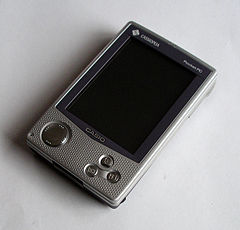|
Casio CassiopeiaCasio Cassiopeia was the brand name of a PDA manufactured by Casio. It used Windows CE (later versions running Windows PocketPC/Windows Mobile) as the Operating system. Casio was one of the first manufacturers of PDAs, developing at the beginning small pocket-sized computers with keyboards and grayscale displays and subsequently moving to smaller units in response to customer demand. Cassiopeia A-10, A-11 and A-11+
Cassiopeia A-20, A-21S, A-22T, A-23G
It was quickly discovered that most consumers wanted smaller devices, so the Palm-size PCs were developed. Japanese models of these units differ in both model number as well as appearance. The E-5x and/or E-5xx models are Japanese versions, colored blue instead of silver. The following versions were developed; A21-S for Student, A22-T for Teachers, A-23G for German (with QWERTZ keyboard),[3] A-20F for French (with AZERTY keyboard).[4] Cassiopeia A-50, A-51, A-55 and A-60
Cassiopeia E-10
Cassiopeia E-11
Cassiopeia E-15The Cassiopeia E-15 was the last model of Palm-size PC introduced by Casio that used a grayscale display. It appeared at the same time as the E-105, and functioned identically to that device, except for the screen.
Cassiopeia E-100The first Palm-size PC model by Casio to have a color screen, the E-100 was outwardly identical to the E-15.
Cassiopeia E-105
Cassiopeia E-115
Casio always advertised the fact that their devices could be updated. Casio decided it would not issue an update for the E-100 and E-105, and a lot of owners of the devices complained. Because of the complaints, Casio offered to update the devices to the newest version of the Operating system if the owners sent in the device and paid a fee. Since the operating system was stored in ROM and not flash memory, the only way to upgrade was by replacing the ROM. Cassiopeia E-125
After using the MIPS processor in the E-15 and the E-1xx series devices, the E-200 switched over to the StrongARM CPU, in keeping with Microsoft's specifications. Cassiopeia E-200
Successors of the Cassiopeia E-200After experiencing difficulties in the market following the release of the E-200, Casio decided not to produce any further units for the US and European markets, instead focusing on the Japanese market. Some Japanese-only models are the Cassiopeia E-3000, using the PocketPC 2002 operating system, and the DT-10 with Windows Mobile 2003. Other Models
References
External links
|